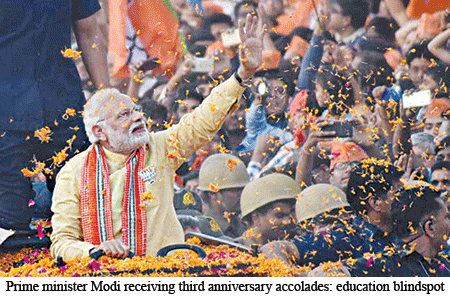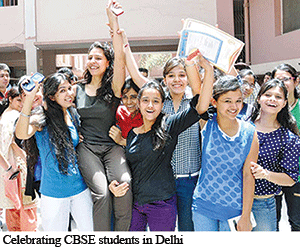 On the third anniversary in office (May 26) of the BJP-led NDA government which was swept to power in General Election 2014 with the largest majority in the Lok Sabha since 1985, the BJP — which has an absolute majority in the lower house in its own right — went to town in an orgy of celebrations. Among the claims of the party led by its messianic prime minister Narendra Modi, who is invested with every virtue imaginable by BJP spokespersons: annual rate of GDP growth is highest worldwide, inflation is at its lowest ebb; the government has rolled out its national goods & services tax (GST) and Ram Rajya (God’s rule) is imminent.
On the third anniversary in office (May 26) of the BJP-led NDA government which was swept to power in General Election 2014 with the largest majority in the Lok Sabha since 1985, the BJP — which has an absolute majority in the lower house in its own right — went to town in an orgy of celebrations. Among the claims of the party led by its messianic prime minister Narendra Modi, who is invested with every virtue imaginable by BJP spokespersons: annual rate of GDP growth is highest worldwide, inflation is at its lowest ebb; the government has rolled out its national goods & services tax (GST) and Ram Rajya (God’s rule) is imminent.
However, there’s an emerging consensus that the education policies and initiatives of the BJP/NDA government are confused and incoherent. Certainly, the promise made in its election manifesto to raise the annual outlay for education (Centre plus states) to 6 percent of GDP has fallen by the wayside. On the plea that as per the recommendation of the 14th Finance Commission, the Central government has increased the allocation of states from the Central divisible pool of taxes by 10 percent, the Modi government has actually reduced Centre’s budget for education.
And in a populist drive, the professedly pro-private enterprise BJP has been targeting private schools — which host over 40 percent of the country’s school-going children — for levying high tuition fees and not abiding by the provisions of the Right of Children to Free & Compulsory Education (RTE) Act, 2009, which controversially transfers a part of the duty of the State (Central, state and local governments) to provide free and compulsory education to children in the 6-14 age group, to privately-promoted schools.
Under s. 12 (1) (c) of the RTE Act, private schools are obliged to provide free education to classes I-VIII children from socio-economically underprivileged households in their neighbourhood. The cost of educating such poor children is to be reimbursed to private schools to the extent of the per-child cost the state/local government incurs in its own schools. Inevitably, there’s a long delay in reimbursing private school managements even these subsidised fee amounts.
According to Kulbushan Sharma, president of the National Independent Schools Alliance (NISA), which has a membership of 36,400 private budget schools countrywide, the BJP/NDA government is “indifferent” to private education providers. “We have made many representations and requests for audience with HRD ministry officials in the past two years, but have never been given a chance to discuss our problems,” he says. Referring to the BJP’s DBT (direct benefit transfer) scheme under which social welfare benefits due to poor households are transferred directly to their bank accounts, he wonders why RTE reimbursement amounts aren’t also transferred to private schools’ bank accounts. “If schools get RTE fee reimbursements through DBT, we would be able to pay our teachers better salaries. The BJP government promised to change archaic laws, but they have made promotion of new schools more difficult,” complains Sharma.
On the other hand, Ambarish Rai, national convenor of the RTE Forum which claims a membership of 10,000 education NGOs, social activists and educationists in over 20 states countrywide, believes that the BJP government at the Centre and in the states, has taken several counterproductive steps to weaken the RTE Act. “We got this law enacted after a lot of struggle but the government is completely silent on its implementation, monitoring and resource provision. Today only 9.6 percent of schools in the country are compliant with infrastructure norms mandated by the RTE Act, and teacher training and learning outcomes are big issues completely ignored by this government,” says Rai.
Likewise, Prof. D.S. Chauhan, president of the Association of Universities (AIU) and vice chancellor of GLA University, Mathura, is disappointed that the Central government has devolved primary-secondary education to the states. “There must be a primary education authority on the lines of the University Grants Commission. Agriculture is the mainstay of our economy but there are hardly any inputs in school curriculums which are useful for children from rural households. Village communities are in deep distress and their self-reliance and traditional skills are evaporating because of faulty primary-secondary education,” warns Prof. Chauhan.
The typical response of Union HRD ministry officials and establishment intelligentsia is to dismiss such complaints and warnings as the carping of disgruntled individuals. But it’s pertinent to note that these individuals are hands-on educators with considerable experience of field conditions. Their opinions and advice shouldn’t be taken lightly.
Autar Nehru (Delhi)
False equivalence fallout
 The delhi-based central board of Secondary Education (CBSE), the largest national school-leaving examinations board which has 18,688 affiliated schools (including 13,657 private schools) in India, under its incumbent chairman R.K. Chaturvedi, an IAS bureaucrat, has acquired the reputation of being a law unto itself. It exercises little restraint in interfering in the selection of principals and teachers, prescribing textbooks and bullying promoters and principals of affiliated schools, even if they are privately promoted and administered.
The delhi-based central board of Secondary Education (CBSE), the largest national school-leaving examinations board which has 18,688 affiliated schools (including 13,657 private schools) in India, under its incumbent chairman R.K. Chaturvedi, an IAS bureaucrat, has acquired the reputation of being a law unto itself. It exercises little restraint in interfering in the selection of principals and teachers, prescribing textbooks and bullying promoters and principals of affiliated schools, even if they are privately promoted and administered.
Therefore, there’s considerable satisfaction within its community of affiliated private schools that a two-judge bench of the Delhi high court (Rakesh Kumar & Anr vs. Union of India & Others — CM No.19732/2017) has passed strictures against the board. It described CBSE’s decision to abolish the moderation policy (which allows examiners to award grace marks when question papers are unusually difficult) after students had completed writing the class XII exam in end April as “unfair and irresponsible”. The court directed the board to continue with the policy while marking the answer papers of 900,000 class X and 1.1 million class XII students who wrote the CBSE examinations between March 9 and April 29.
“By April 24, when the respondents (CBSE) commenced the changes in the policy, many students had in fact completed their examinations. The marking scheme for the answer sheets was distributed to evaluators on March 20, 2017. The evaluation also commenced on or above the same date. Change of policy has been effected without notice to students, universities etc, which may completely change the course of academic future of the students. Grave and irreparable loss and damage would endure (sic) to the students if interim relief is not granted. It needs no elaboration that rules of the game cannot be changed after the game has begun,” said the order of the two-judge bench restraining CBSE examiners from making any changes in the moderation policy in the academic year ended April 30.
CBSE’s moderation policy was introduced in 1992 during the rule of the Narasimha Rao-led Congress government to compensate examinees for errors/ambiguities/difficulties in questions, examiner subjectivity, and to maintain parity of passed students vis-a-vis preceding years.
However, during the past five-six years, CBSE’s moderation policy has translated into a practice of artificially boosting the marks of its students so they aren’t at a disadvantage vis-a-vis students of schools affiliated with India’s 31 state boards in the annual scramble to secure admission into the few dozen (out of 800) top-ranked universities. Because the Union HRD ministry, University Grants Commission and the All India Council for Technical Education (which supervises and regulates all engineering and technical undergrad colleges countrywide) give equal weightage to the marks awarded by all exam boards in the school-leaving class XII examinations even though it’s common knowledge that the exams of state boards — some of whom permit widespread cheating and malpractice — are undemanding, the pan-India CBSE and CISCE boards encourage liberal marking of their students. Inevitably, this race between exam boards has got out of hand, with the country’s most admired undergrad colleges stipulating 100 percent for admission into their computer science and commerce courses and above 95 percent for other subjects.
With grades inflation in India’s 33 exam boards out of control and admission officers in the country’s top-ranked undergrad colleges confronted with the conundrum of untrustworthy certification, there’s a rising chorus within top-ranked colleges for permission to conduct their own entrance exams and/or a post-class XII common entrance exam modelled after the American SAT (Scholastic Aptitude Test). “Simultaneously there is urgent need for the Central and state governments to liberalise and deregulate Indian higher education to encourage private edupreneurs, trusts and philanthropists to establish high-quality greenfield universities to bridge the demand-supply gap in higher education,” says S.K. Bhattacharya, president of the Action Committee of Unaided Recognised Private Schools (estb.1997), an umbrella organisation of six associations of private schools in Delhi NCR.
But with the ruling BJP/NDA government at the Centre showing scant interest in major education reform and over sensitivity towards the regressive education ideas of the RSS/sangh parivar, liberalisation and deregulation of India’s moribund education system is a distant mirage.
Swati Roy (Delhi)